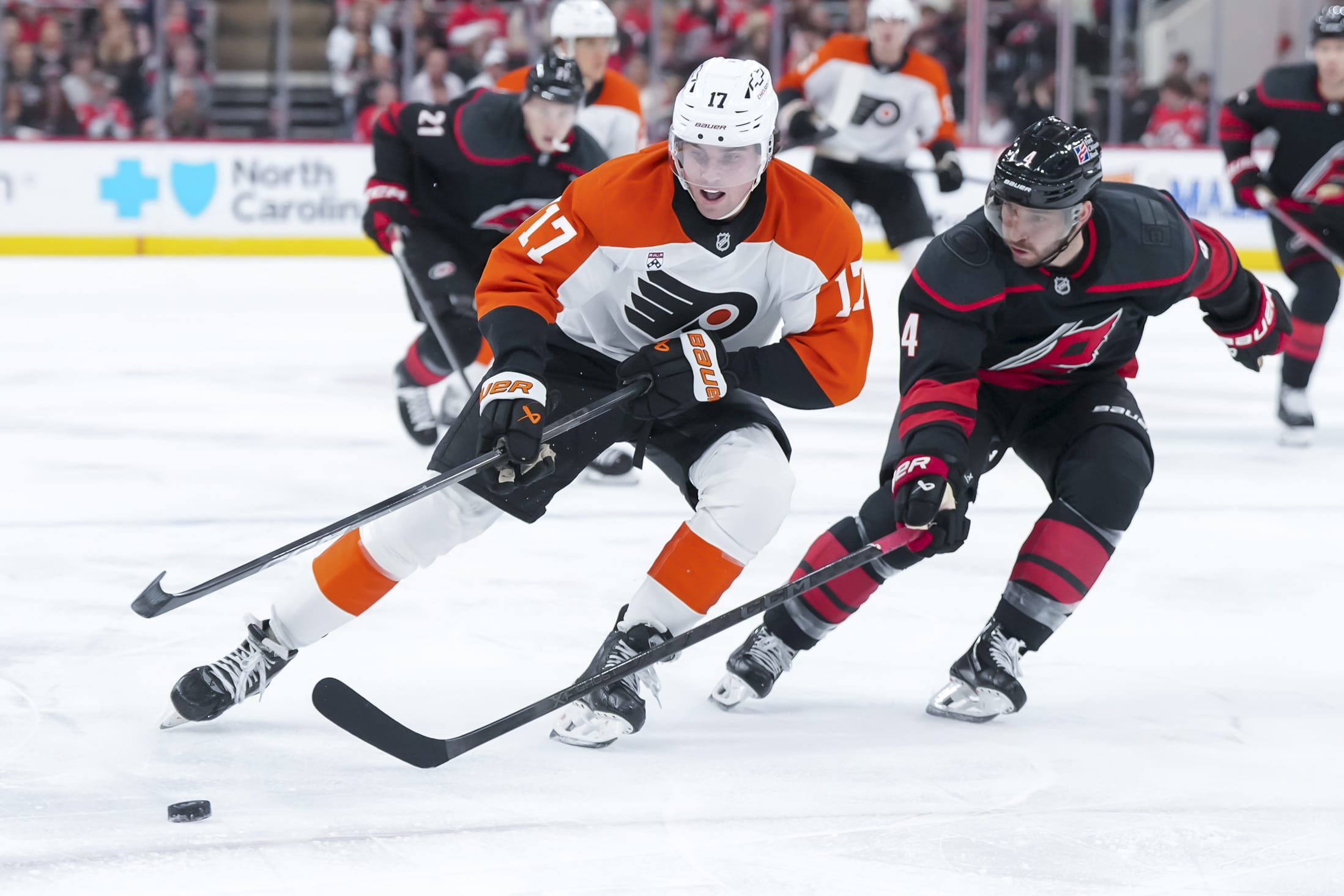© 2026 ALLCITY Network Inc.
All rights reserved.

Just like last season, Jett Luchanko made the Philadelphia Flyers‘ roster out of camp, rather than being assigned to his junior team, the Guelph Storm.
And just like last season, Jett Luchanko played in four games with the big club before ultimately ending up back in Guelph.
On Monday morning, Luchanko was not on the ice for practice with the rest of the Flyers players, and minutes later, the team made it official: Luchanko was no longer on the roster, and was heading back to juniors.
“(It was) very simple. We want him to play high minutes,” Briere said on Monday. “We’ve liked what we’ve seen, he could have stayed here, he showed that he can play, but we want more than that for him in the long run.”
And Luchanko certainly wasn’t getting many minutes. In four games with the big club to start the year, he cracked the 10-minute threshold only once — in a 5-2 loss to Winnipeg. Overall, he had averaged just 8:58 minutes per game, largely in a fourth line role with Nikita Grebenkin and Garnet Hathaway, and had served as a healthy scratch four times.
This wasn’t like last season, when then-head coach John Tortorella was deploying Luchanko in the top-nine with scoring wingers and even giving him some special teams time. Rick Tocchet had Luchanko in a fourth line role, and Briere seemingly didn’t see a clear-cut path to the 19-year old getting more duties — at least, not with them.
“We felt at this point, it was time for him to start playing high minutes and more of an offensive role,” Briere added. “Get back playing power play, killing penalties, facing the top opposition on the other team on a nightly basis.”
That does raise the question of why he made the Flyers out of camp in the first place, since their start-of-season center depth did make Luchanko’s path to a larger initial role tough to envision. To start 2024-25, the Flyers were extremely thin down the middle, especially accounting for Sean Couturier’s ugly finish to 2023-24 & the fact that Noah Cates didn’t even start the season as an every-night center after a tough sophomore campaign. This year, however, the battle for quality minutes was far tougher, with all of a resurgent Couturier, a re-emerged Cates, Trevor Zegras and Christian Dvorak in the mix.

And by Briere’s own admission on Monday, he didn’t love Luchanko’s first week of training camp, feeling he started slow due to missing rookie camp (and development camp in July) and battling injury all summer long. What Briere did love, though, and what might explain why Luchanko ended up on the NHL roster to start?
Luchanko’s work in Allentown with the Lehigh Valley Phantoms to end the 2024-25 regular season and into their playoff run.
“He played really well. He was arguably our best player down the stretch and into the playoffs,” Briere noted. “That was really encouraging to see. He was able to put up points as well.”
In other words, it was Luchanko’s play with the Phantoms — three points in nine regular season games and then six more points in seven playoff games — that earned him a favored place at main camp this fall. And when Luchanko’s play did start to trend up in the second half of camp, the hope was that he was on a path to get back to where he was in Lehigh Valley.
That guy looked ready to be a legitimate NHL contributor. And that guy, Briere implied, might have been able to force his way up the Flyers’ lineup and earn enough ice time to justify keeping him around all season long.
“Keep in mind that all of these guys – other than Sean (Couturier), who’s played his whole career in the middle – Cates, Zegras, Dvorak can also play the wing,” Briere said. “So if (Jett) had come in & really forced our hand, forced us to find a way (to get him) in the top-9, it might be different. But we didn’t feel he was quite ready for that role.”
Luchanko, in the mind of Tocchet and the front office, was playing well enough to justify fourth line minutes. For a 19-year old, that was impressive. But it also wasn’t going to be enough to stick all year long.
“I thought after (the slow start to camp), he was coming around. But again, playing 6-to-8 minutes a night is not ideal for him,” Briere noted.
It would have been the Flyers’ preference to send Luchanko back to the AHL, to the level where he showed so much promise at the end of 2024-25. But unfortunately for Philadelphia, Luchanko’s age-19 season came one year too early for the youngster to be eligible for a demotion to the minors. Due to the old NHL/CHL agreement that lasts through this season, it was either the NHL or a return trip to the OHL for Luchanko — he wasn’t permitted to go to the AHL.
And it’s clear the Flyers would have sent him there if they were allowed to do so. But they weren’t, so they couldn’t.
“It would have been perfect for a guy like Jett, because of where he’s at in his career and how he played last year in the American League, not quite ready to play in a top-nine role in the NHL,” Briere said. “It would have been ideal.”

Now, there was one way that the Flyers could have gotten Luchanko at least some AHL time in the here and now — an AHL conditioning stint. Had Luchanko sat as a healthy scratch for five consecutive games (he had already sat for the last two, so three more would have sufficed), he would have become eligible to be reassigned to the AHL for two weeks, if Luchanko agreed to the assignment. It’s how Seattle was able to give Shane Wright five AHL games in November and December of 2022 despite Wright being just 18 years of age at the time.
According to Briere, the Flyers did consider going that route with Luchanko, perhaps as a way to extend his developmental time under the watchful eyes of the organization just a bit longer. There’s even a world where the Flyers could have reassigned him to the Phantoms in early November, given him two weeks in the AHL, and then spread out five more appearances with the big club until Luchanko would leave for Canada’s World Juniors selection camp in December, keeping him technically with the big club all the way through January at least.
But Briere and the Flyers ultimately decided against it.
“Yeah, we looked into that,” Briere said. “We just felt… it was another week of him sitting around, and you’re not allowed to play him.”
Then, those two weeks in the AHL would have flown by, and the Flyers would quickly have been back in the same conundrum.
“We would have had to wait another week (before starting the conditioning stint), and after that, you’re only allowed two weeks (in the AHL), & you’ve got to keep him on your (NHL) roster,” Briere explained. “That complicates things. There’s all kinds of little things like that, that were coming into play that just made it difficult. So we figured it’s best just to send him back, have him go play heavy minutes & get ready for his junior year & hopefully the World Juniors.”
Over the past two seasons, the Flyers have learned that Luchanko can indeed hold his own at the NHL level. And after his work with the Phantoms in March and April, they were legitimately curious if he was indeed now ready to fully break down the NHL door, and to be more than just a bottom-of-the-depth chart forward for the club.
But in their estimation, he wasn’t.
And perhaps it shouldn’t come as a major surprise. Tocchet regularly critiqued Luchanko’s seemingly pathological unwillingness to shoot (just two shot attempts in four games). And Luchanko has yet to deliver a full-fledged offensive breakout even at the OHL level, posting seasons of 1.09 and 1.22 points-per-game with Guelph — solid scoring numbers, but not elite levels.
The Flyers believe there’s more in there in terms of offensive upside. The hope in sending him back to the OHL is that he’ll be able to unearth it.
“We know he’s reliable defensively,” Briere said. “What we want to see from him is (to) take some chances and see how far he can push his game on offense. That’s what we’d like to see from him.”
Guelph is far from a powerhouse, but they appear much improved this season as compared to 2024-25, when they posted a 21-38-5-4 record — second-worst in the entire OHL. This year, they’re at a much more competitive 6-5-2-0 through 13 games, and hopefully better suited to provide Luchanko with offensive support to help foster that side of his game. If not, a trade to a legitimate OHL contender is always possible.
Regardless, Luchanko will be getting heavy minutes wherever he plays — more than he would have been likely to receive in Philadelphia. He’ll look to use those minutes to better prepare himself for his first full season of pro hockey in 2026-27.
“Look, he’s a big part of our future,” Briere reaffirmed. “We’re excited about him. We just want to try to develop him the right way.”
Comments
Share your thoughts
Join the conversation



